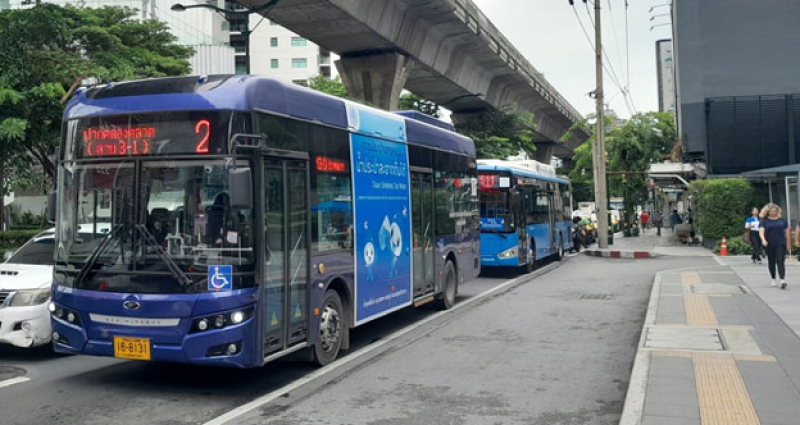- Israel Strikes Tehran with US Support Amid Nuclear Tensions |
- India Sees 9% Drop in Foreign Tourists as Bangladesh Visits Plunge |
- Dhaka Urges Restraint in Pakistan-Afghan War |
- Guterres Urges Action on Safe Migration Pact |
- OpenAI Raises $110B in Amazon-Led Funding |
Bangkok Eyes Low-Carbon Future with Green Transport Shift

Electric buses are servicing Bangkok commuters.
Thailand’s transport sector is a major contributor to national greenhouse gas emissions, accounting for 18.4 per cent of the country’s total emissions. Bangkok stands at the centre of this challenge. With more registered vehicles than residents, traffic congestion worsens air pollution and strains the city’s roads and mobility infrastructure.
While investments in mass transit systems such as the BTS Skytrain, MRT subway, Airport Rail Link, and public bus services are expanding, Bangkok’s informal on-demand transport remains vital to its mobility ecosystem. Motorcycle taxis and tuk-tuks continue to provide essential first- and last-mile connectivity, especially in areas underserved by fixed-route systems. By strategically integrating both formal and informal transport into urban planning, Bangkok can transform its diverse mobility landscape into a driver of low-carbon development.
Bangkok’s informal fleet includes more than 8,000 registered tuk-tuks and 63,000 motorcycle taxis. The opportunity lies in electrifying—not replacing—this vast network as part of a sustainable city vision.
Innovative alternatives are already emerging. Ride-hailing service MuvMi uses electric tuk-tuks and a mobile app to provide affordable, shared rides. Since its launch in 2017, MuvMi has reduced over 1,700 tonnes of CO₂ equivalent, demonstrating the climate benefits of private-sector solutions.
Similarly, Winnonie, an electric motorcycle rental platform with a 24/7 battery-swapping system, targets motorcycle taxi drivers and delivery riders. This model eliminates the need for down payments or long-term commitments, helping drivers switch to electric vehicles more affordably while lowering operational costs.
However, the transition of traditional tuk-tuks faces challenges. Many drivers rent their vehicles and rely on tourism, making the high upfront cost of electric tuk-tuks a significant barrier. A lack of manufacturers and dealerships further discourages conversion due to concerns about reliability and after-sales support.
Motorcycle taxi drivers face similar hurdles. High vehicle costs, limited financing, and non-standardised battery-swapping systems restrict growth. Without supportive policies to address affordability, convenience, and interoperability, large-scale electrification of this fleet will remain difficult.
Bangkok is also progressing towards electric public transport. The Bangkok E-Bus Programme will deploy 1,913 electric buses on 122 routes, supported by a climate finance partnership under Article 6 of the Paris Agreement. Swiss-based KliK Foundation purchases internationally recognised carbon credits from Thailand, helping to fund the procurement of electric buses. This programme is expected to reduce 500,000 tonnes of CO₂ equivalent between 2021 and 2030.
In parallel, the state-run Bangkok Mass Transit Authority (BMTA) plans to replace 2,300 conventional buses with 1,520 electric buses between 2025 and 2032. This initiative aims to enhance service quality and reduce PM2.5 air pollution.
Private operators are also expanding electric fleets, but direct government investment marks a major step towards cleaner public transport.
Bangkok’s low-carbon transport network now extends to electric water ferries on the Chao Phraya River. The MINE Smart Ferry service offers an eco-friendly option, operating 35 electric vessels connecting with rail lines. With capacities of 150 to 250 passengers, the ferries run every 15 to 30 minutes at a flat fare of THB 30, paid via contactless systems.
Despite progress, Bangkok’s sustainable transport transition faces significant obstacles, including fragmented fare systems, high vehicle costs, limited financing, and insufficient charging infrastructure.
To address these challenges, the ASEAN Electric Vehicle (EV) Accelerator Programme, in partnership with the ASEAN Secretariat and the Mobility and Vehicle Technology Research Center, aims to help policymakers accelerate the shift to electric public transport. Pilot countries include Cambodia, Indonesia, Malaysia, and Thailand.
To strengthen progress, policymakers should focus on integrating fares, offering financial incentives such as subsidies or low-interest loans, and establishing technical standards for vehicle conversion and battery-swapping systems. Coordinated public and private investment is also essential for expanding charging and maintenance infrastructure.
Bangkok’s commitment to building a cleaner, more equitable transport system provides a model for other rapidly growing cities aiming for sustainable urban development.

